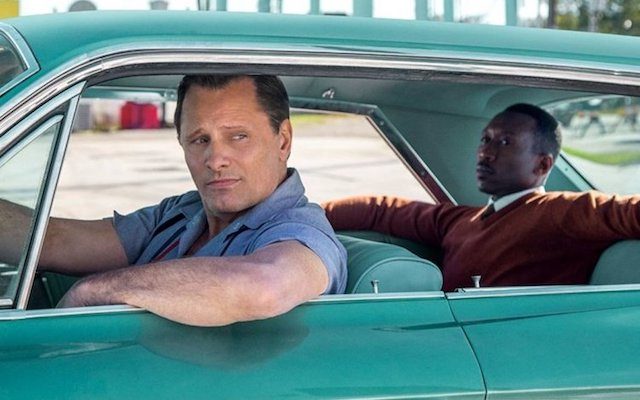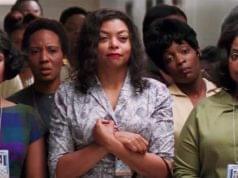
Racism is solved one moron at a time in “Green Book,” a lighthearted, vaguely true story set in 1962, with bigoted Bronx-Italian meathead Tony “Lip” Vallelonga (Viggo Mortensen) hired as chauffeur and bodyguard for refined black concert pianist Dr. Don Shirley (Mahershala Ali) as he tours the racist Midwest and the RACIST-racist South. Forced to see firsthand how racism affects an actual black person, Tony softens his own prejudice and becomes a defender.
That’s basically the whole movie, but I haven’t spoiled it for you. How else was this story going to play out? Touring with a black man makes Tony dislike minorities even more than before? (Please do not make a movie like that.) Directed by Peter Farrelly (his brother Bobby sat this one out) from a screenplay by Tony Lip’s son Nick Vallelonga and Brian Currie, it’s a pleasant, humorous movie, affable but extremely shallow. It provides a glossy look at the racism that was often deadly in real life, told from the perspective of the white guy who overcomes his own prejudice, not the black guy who actually experienced it. As likable as the movie is, I couldn’t shake the feeling that Shirley’s story would have been so much more interesting than Tony’s.
Not that Tony isn’t an intriguing character himself (at least the way he’s depicted here). A sly, streetwise opportunist who tries to ingratiate himself with the mobsters who frequent the club where he’s a bouncer, he’s the sort of striver who enters (and wins) a hot dog eating contest when funds are low. His racism, suggested by the language he uses, is firmly established when he throws away the water glasses that his wife (Linda Cardellini) let the black repairmen use while working in their apartment. Later, when Dr. Shirley interviews him for the chauffeuring job and asks if he would have a problem working for a black man, Tony assures him he wouldn’t. “Just the other day my wife and I had a couple of colored guys over,” he says. “For drinks.” Good thing Viggo is charming or his character would be despicable.
The elegant Don Shirley, who lives in an apartment above Carnegie Hall, is initially humorless and guarded, though he warms up over time as he and Tony spend two months on the road, guided by the Negro Motorists’ Green Book, which told African Americans in the segregated ’60s which hotels and restaurants were safe to patronize. Their odd-couple dynamics, made more amusing by Tony’s obvious discomfort at being a black man’s flunky, give way to mutual respect: Don helps Tony write letters home; Tony helps Don learn how to be black. Trained in classical music before being forced to shift to jazz (people wouldn’t accept a black guy playing Chopin), Don has heard of Little Richard and Aretha Franklin but doesn’t know their music until Tony introduces him to it. He’s never eaten fried chicken, either, and must be taught how by Tony. This is cringeworthy, but it leads to one of Tony’s best dumb-guy lines as he relishes a dining opportunity in a particular state: “Kentucky Fried Chicken! In Kentucky! When’s that ever gonna happen?!”
Mortensen’s excellent performance makes Tony slightly more than just a stereotype, his spot-on accent and mannerisms supported by the hint of depth in the character. Ali’s performance is richer, though, embodying Don Shirley’s loneliness and repressed anger (not to mention his musical prowess, which Ali fakes admirably). Whatever flaws the film has, its two leads are well-matched, with an easygoing rapport. And there’s an undeniable thrill to seeing racist crackers get their comeuppance, no matter how contrived or manipulative it may be.
But I keep coming back to this. The film begins with the words “inspired by a true story,” and we recognize that “inspired by” grants filmmakers more artistic license than “based on,” which implies fidelity to the truth. And that’s fine. But then the film ends with photographs of the real Don Shirley and Tony Lip, with onscreen titles telling us about the rest of their lives. This undercuts the “inspired by” disclaimer and leaves us with the impression that what we’ve just seen is true. It revokes, somewhat, the artistic license, leaving less room for excuses when we learn (for example) that Shirley was never estranged from his brother and certainly did not have to be taught by a white dude how to eat fried chicken. It adds to the slightly sour taste we already had in our mouths because of the movie’s point of view, making it seem all the more like a well-intentioned but rather clueless feel-good effort.
B- (2 hrs., 9 min.; )





